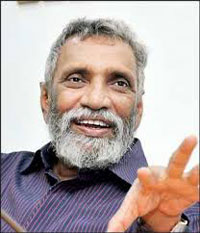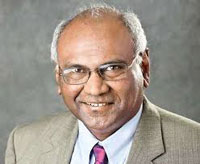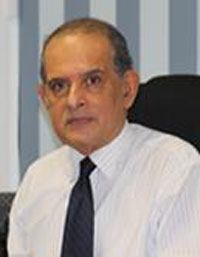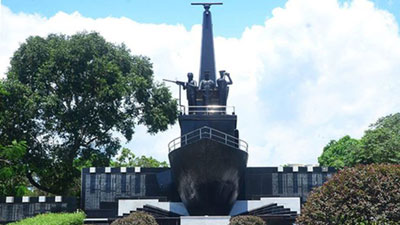Columns
COVID’s ominous vigil over the gated nation
Just when the Government had thought it safe on Sunday to unlock the gated nation and return a semblance of normalcy to the land, since the dreaded coronavirus seemed to have been held at bay and kept at a comfortably safe arm distance as the stagnant body count and tiny trickle of patients showed, the sudden influx of 32 positive cases on Monday afternoon set off the alarm bells and led to the immediate countermanding of the ‘set free’ order, thus nipping in the bud the hope of plucking the coveted votes of a smashing May election.

EC CHAIRMAN: Deshapriya
It vividly demonstrated the pathetic plight of mankind today: What the Government proposes, the COVID disposes.
It also revealed the foresight and common sense of Elections Commissioner Mahinda Deshapriya and his grasp of reality. Whilst declaring on 19 March the Commission’s decision to postpone the general election scheduled for 25 April, the Election Chief adamantly refused to announce a date on which it will be held next, even though constitutionally bound to do so.
In the face of the media demanding him to disclose a date, he stated: ‘That date is not for me to determine. Or for that matter, for anyone else to determine. As things stand today, only the coronavirus can determine that date.’
Today he stands vindicated for his refusal on March 20 to set a new date. As commented in last week’s SUNDAY PUNCH which was published in the SUNDAY TIMES online edition on Sunday April 19 under the headline ‘General elections amidst a COVID Pandemic? You must be joking!’, the final determination of the election date depends on two legal authorities, namely, the Commission of Elections to name a date; and on the President who is under a constitutional duty as per Article 33 to ‘on the advice of the Election Commission, ensure the creation of proper conditions for the conduct of free and fair elections and referenda.’
Unless the President wields a magic wand to wipe out the coronavirus with one wave of his hand, can any president discharge the constitutional duty thrust upon him to create ‘proper conditions’ in the present pandemic climate? Doesn’t the constitutional proviso imply that the proper environment must first be created and be in existence for the election to be free and fair? That it is a prerequisite without which a ‘free and fair’ election will be a sham in practice, a nullity in law?

EC MEMBER: Hoole
If an election held through the barrel of a gun will not be considered as ‘proper conditions’ for the nation to vote in, will an election held in a deadly COVID pandemic, swamped and bogged down in a pestilence-ridden climate, where one is dicing with death and playing Russian roulette with one’s family too, be considered a ‘proper’ environment for one to cast one’s vote, wishing for a better tomorrow?
This Monday’s flood of 24 new positive patients at Bandaranaike Mawatha, Colombo 12 brought this point strikingly home to the authorities. That as much as they had hoped to furrow the ground and make it ready for a snap May poll, the chances of creating the proper conditions as constitutionally required were too bleak to contemplate. Thus, the very notion of it was wisely discarded.
Prime Minister Mahinda Rajapaksa said that the government’s top priority, at the moment, was to neutralise the threat from the coronavirus, and the elections could be delayed till the nation recovered. The situation in the country now demands that we must first focus on eliminating this threat from the coronavirus. We can hold elections thereafter.”
 The three-member Election Commission — Chairman Mahinda Deshapriya, Ratnajeevan Hoole and N.J. Abeysekera — met on Monday evening to decide the new date for the general election. A proposal, it is reported, for holding the election on May 20 was defeated as was a second proposal for holding the election on June 2. Finally, the three members of the commission had decided to hold the election on June 20.
The three-member Election Commission — Chairman Mahinda Deshapriya, Ratnajeevan Hoole and N.J. Abeysekera — met on Monday evening to decide the new date for the general election. A proposal, it is reported, for holding the election on May 20 was defeated as was a second proposal for holding the election on June 2. Finally, the three members of the commission had decided to hold the election on June 20.
But even on that date, does the Election Commissioner think he will able to hold a general election for over 15 million registered voters? In the 55 days left remaining to him from today to election date, is he cocksure the obstacles he mentioned on March 19 that made it impossible for him to hold the April 25 polls will disappear like a rainbow in the sky?
Or, as his March 31 letter to the President’s Secretary, P.B. Jayasundera states, ‘if for some reason the present situation does not improve completely then it will not be possible to hold the elections before the end of May,’ does he expect the present situation as of now to radically improve to make it possible for him to hold the new election on 20 June? Will 55 days see the miracle he seeks to hold polls with COVID having taken flight from Lankan shores?
 Is June 20 a realistic date when the coronavirus will be history or is it mere wishful thinking on his part to prevent him from becoming history himself?
Is June 20 a realistic date when the coronavirus will be history or is it mere wishful thinking on his part to prevent him from becoming history himself?
When the Election Commission’s decision was made public amidst talk there was trouble brewing amongst the three member commission, it ran into controversy and by the look of it, the signs are that it will be challenged in court.
First to lead the charge was the leader of the Sri Lanka Muslim Congress (SLMC) Rauf Hakeem who met the Election Commission on Tuesday and alleged that fixing of the date for the forthcoming elections on June 20 amidst the COVID-19 pandemic complex situation in the country was “unconstitutional and illegal.”
In a letter to the Election Commission, Hakeem states that ‘there could be no level playing field, given that the country is now under curfew and lockdown. Uncertainty prevailed over whether curfew would be completely lifted in some areas like in other areas, and if normalcy would return to some areas under surveillance for COVID-19.’ Besides, these areas, the SLMC leader claims, were ‘earmarked as ones that did not vote in favour of the President at the last election.’
Hakeem’s letter concludes by stating: ‘As a political party that represents vast number of voters, we are saddened by the Commission’s act of not taking into consideration of the obvious current situation and the threat that poses to public health is not only unconscionable but also puts the entire population of our country at serious risk of being affected by the contagion. Therefore, we urge the Commission to review its decision and act in compliance with the Constitution and the law.”
Meanwhile, it is reported that JVP Propaganda Secretary and former parliamentarian Vijitha Herath said political parties and civil organisations would definitely challenge the EC decision to hold the election on June 20. Samagi Janatha Balawegaya leader Sajith Premadasa, too, had expressed his objection to this arbitrary, off the hat choice of date.
Apart from these objections voiced by party leaders and echoed by the public that even this new date is far too early to hold a general election, how does the coronavirus factor figure in the equation?
In normal times, a Lankan general election would consist of hundreds of candidates vying for 225 seats; with over 15 million registered voters casting both their choice of party and their preference vote for their favoured individuals; and a whole army of election staff, party agents, election observers and security personnel to ensure the smooth functioning of each poll and the proper counting of the ballot at each counting centre. In normal times, the whole exercise would be a cake walk for the Election Commission.
But these are not normal times. Apart from the usual logistics involved, there will be two extracurricular activities to perform.
The first will be the Herculean challenge to hold a general election in an atmosphere laden with the COVID scourge while simultaneously trying to prevent the mass spread of the virulent virus. On June 20, over 15 million people will be asked to meet and queue in sizable groups at polling stations scattered around the countryside, at a time when the nation’s health hazard warnings dictate that even two’s a crowd. Invariably social intercourse will take place. And the inevitable will happen.
The second extra curricula activity will be to ensure that the purpose for which the election is held which is to elect a new government according to the free will of the people is duly achieved and the final result duly reflects the people’s choice and is not a grotesque distortion of it. It has happened in the past in normal times. How much easier will it be for it to recur under the all-encompassing COVID cover of darkness?
Can the government guarantee that there will be no spread? For, unlike the plugging of a leak, once the sluice gates are opened none can hold back the tide or turn back the flow. Even if a guarantee is offered with a proviso to resign if the guarantee is not met, can the nation risk a mass COVID outbreak on the simple assurance of another mortal? Can resignation atone for the deaths of thousands? Especially, at a time when the Guardian Deities themselves seem to look askance at the unfolding tragedy of Lanka’s and the world’s blight?
Perhaps in their heart of hearts the Election Commission members know of the impossibility of holding a general election in these circumstances, fraught as they are with all the dangers attendant with a pandemic. They may have also realised their own impotency to find a way out of this dilemma.
On March 31, Elections Commission Chairman Mahinda Deshapriya wrote to the President’s Secretary stating: ‘Accordingly, if for some reason the present situation does not improve completely then it will not be possible to hold the elections before the end of May; and as a result a new parliament will not be able to sit before June 2 which may lead to a constitutional conundrum, the Election Commission has observed.’
The presidential reply ruled out the possibility of the President seeking an opinion from the Supreme Court. The President’s Secretary gave the matter short shrift, stating, in no uncertain terms, that, ‘I am instructed to inform the Election Commission that the question of Reference to the Supreme Court in terms of Article 129 of the Constitution does not arise.’ The presidential reply also made it clear, ‘‘the date for fixing the poll is the responsibility of the Election Commission and His Excellency has no wish to interfere with duties and obligations of the Election Commission.’
Without a legal ruling on the matter to guide them and the onus to declare a date completely on the Election Commission and the pressure mounting on it to announce the date, perhaps the June 20 date was randomly chosen. The confusion gets worse confounded when S 10 (2) (b) (i) of the Parliamentary Act 1988 states the poll shall be taken on ‘a day not less than five weeks and not more than seven weeks from the closing day of the nomination period.’’
The nomination period ended on 19 March. The Commission has announced June 20 as the new election date. A period of 13 weeks after the nominations has closed, 6 weeks later than the law allows. How is the June 20 date reconciled with the legal requirement? Has the applicability to section 10 (2) (b) ever been tested in the Supreme Court?
Unless a miracle happens and the coronavirus flies off to more exotic destinations abroad, leaving Lanka COVID free by June, perhaps, the Election Commission Chairman has plans to postpone it in the same way he on March 19 postponed the April 25 poll, saying as he accurately said then ‘no one can decide the date, only the coronavirus can decide the new date’.
But in the meantime, perhaps, he and his 2 co-members of the Commission are hoping against hope that their own decision to hold the new election on June 20 will be challenged in the Supreme Court by the stakeholders. Then, at last, armed with the opinion of the Supreme Court as the legal road map, they will be able to discharge their duties not only efficiently but also within a legal framework.
For even whilst battling the COVID pandemic, the Constitution and the laws that flow from it should not be summarily dismissed in the guise of COVID expediency.
Is this the start of the COVID stampede?  COVID CLOSES NAVY CAMP: With 59 Navy personnel testing positive for coronavirus on Thursday, the Welisara Navy Camp had to be locked down and placed under quarantine Bad as it was, Lanka’s COVID toll when compared to other countries showed that the epidemic was being contained: that the face mask and the hand wash message was getting through: that the stay-at-home rule was being largely observed though few played truant: that the social distancing coupled with no mingling policies were paying off: that Lanka was maintaining steady course as the statistics showed: that with great restraint and patience and with a little bit of luck, the country could pull though this unprecedented calamity. On Monday morning, a confident government had lifted the curfew from 5am to 8 pm in all the districts except Colombo, Gampaha, Kalutara, Puttalam and Jaffna. The indefinite curfew in these five districts which had remained in force for four weeks were to be lifted from 5am to 8pm on Wednesday, in the islandwide exercise to restore normalcy to the island as part of the nation’s exit strategy. The people were planning to be free again soon, to emerge from exile, from their hibernations, from their curfew-imposed stays within four walls. The Health Ministry’s daily update on the COVID toll on April 20 Monday morning at 10 am:
But by evening the amiable winds had changed. An ill wind had begun to blow. And the optimism which had reigned all along with the belief that the authorities were on top of the situation began to erode hour by hour and the question was being asked: ‘Had we in our confidence that the worst was over, let down our guard and screwed it all up? Had we been too hasty to hope for normalcy, too impatient for civilian life to return and too arrogant in our ambitions to conquer COVID overnight? To vanquish the virulent virus which not even the Chinese had been able to quell during four months of its terror reign? On Monday evening, the morning toll of 271 confirmed COVID cases rose to 303 with the detection of 32 positive cases in Colombo. Director General of Health Services, Dr. Anil Jasinghe, said this was the highest number of COVID cases reported in a day. All these were in quarantine centres and had associated with COVID patients in the Colombo city. About 1010 people living in the same compound were rounded up and sent to quarantine camps in the countryside. A report claimed a fish vendor at the Peliyagoda fish market tested positive and this made the total toll 304. On Wednesday, eleven more patients tested positive for COVID-19 increasing the number of cases to 321 in the country. The Health Ministry said, the patients, residents from Beruwela were reported from quarantine centres. Another person had been detected in Polonnaruwa. One week ago the Government’s epidemiologist report of April 15th had listed the Polonnaruwa district as being 100 percent COVID free but today, with the discovery of the positive patient, it has one on its bed card. As a result, 12 villages in Lankapura area in Polonnaruwa have been isolated. The worst for this week was still to come. On Thursday, it was announced by the Army Commander General Shavendra Silva that 29 Navy personnel at the Welisara Navy base camp had tested positive for the coronavirus. He said the 29 Navy personnel have contracted the virus during the recent search operation carried out in Suduwella, Ja-Ela to find out suspected COVID-19 patients. The total infected cases stood at 368, according Health Ministry official figures. On Friday it was revealed that another 30 naval personnel from the same Navy Camp at Welisara had also tested positive for COVID. This increased the total confirmed cases to 414. By Saturday, at least 4,000 naval personnel and their families in the Welisara Naval Complex had been isolated within the camp. They will be tested for the virus in accordance with the urgency to do so, the Navy said. Naval authorities also said that upon confirmation that a naval person from Polonnaruwa has been infected with the new coronavirus while on leave, the PCR test was conducted to gauge the spread of the disease among other naval personnel who were sharing the same mess and working at the office with the victim at the Welisara Naval Complex. The week had started with Monday morning reporting the presence of 271 COVID positive cases in the island. By week’s end on Saturday morning of April 25 at 10 am, the number of confirmed coronavirus cases had risen to 420. An increase of 149 cases within just six days. Medical officials, however, maintain that the naval camp instance and the Bandaranayake Mawatha, Colombo 12 instance which had led to 102 confirmed COVID cases cannot be taken as instances of the coronavirus spilling into the community on a mass scale since both took place within confined spaces which were immediately controlled and those suspected quarantined. But since the coronavirus has given the first hint of the vast scale damage it can inflict within a week, nay, even a day if left loose to run riot amongst the mases brandishing its own mini version of deadly cluster bombs, it’s best to brace ourselves for worse to follow. And remember, even in this surreal zone, it is always darkest before the dawn. | |



Leave a Reply
Post Comment